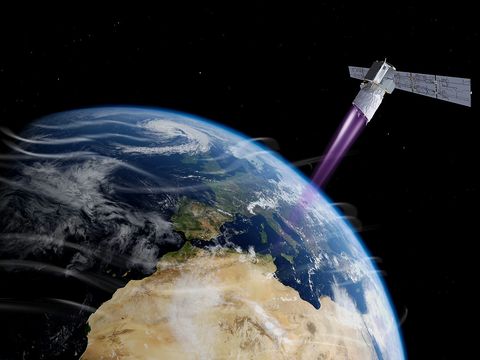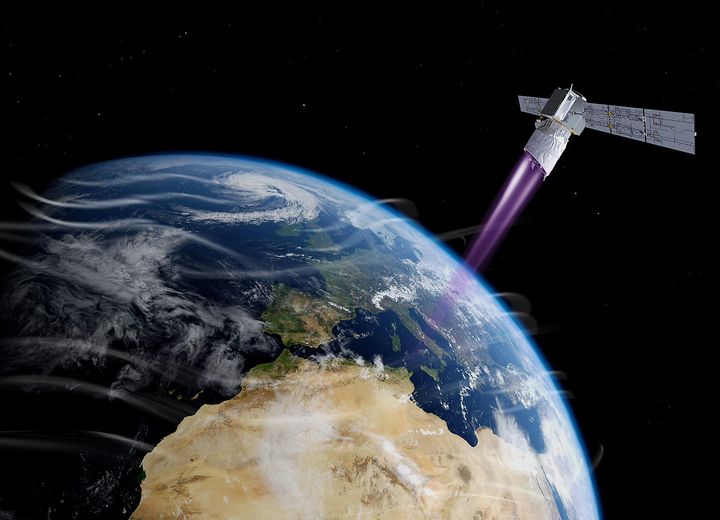France, cradle of European space and Airbus
Airbus has not only ‘given birth’ to Airbus aircraft, it is also the European - and, moreover, French - champion of space.
Every year, a dozen satellites leave our cleanrooms to reach Earth's orbit, the Moon, Mars or the farthest reaches of our solar system.
With around 6,000 employees based mainly in Toulouse, Elancourt and Sophia Antipolis, there are more space experts in France than any of our other ‘home nations’.
It is here that the majority of Airbus satellites are conceived, designed, manufactured, tested and operated. Many instruments and other equipment are manufactured here. Finally, many space-related services are operated from our French sites.
At the heart of the French space ecosystem, Airbus contributes to France’s global influence, as a leading space nation, as well as to its industry.
Because space is important for our company, our industry, our nation and society as a whole, the entire French space industry has joined forces in the Spacearth initiative.
Eyes focused on Earth
Airbus is a recognised world leader in geo-information data and services, with a large number of commercial, institutional and defence customers. With exclusive commercial access to the world's largest commercial fleet of optical and radar satellites, Airbus meets the needs of a wide range of markets, from environmental management and maritime safety, to civil engineering and business intelligence. Every year, millions of square kilometres are photographed by our satellites and used for a wide range of purposes, from highly sophisticated analysis to extract precise information, to simple visualisation in Google Earth.
Imagery from space (both optical and infrared) is used to support more efficient, precision farming that helps reduce the use of fertilisers and pesticides. With its Farmstar service, Airbus has been supporting French farmers for more than 20 years who want to cultivate their crops in a more sustainable way.
Today, more than 13,000 farmers use the service. Find out more about Farmstar
Our colleagues innovate on a daily basis to enable our satellites to accelerate progress in science, meteorology and climate, and even help save lives as part of the international "Space and Major Disasters" charter.
Description: Satellite imagery provides invaluable information to the institutions that guarantee our security and sovereignty, but also a wealth of information that, once cross-referenced, reprocessed and analysed, becomes real intelligence for many players (scientists, politicians, economic decision-makers, entrepreneurs, developers, etc.).
The latest additions to the Airbus satellite fleet, Pléiades Neo, are in orbit and provide daily images with a resolution of 30 cm - the best on the market.
Distance shouldn't disconnect us from our loved ones
Airbus is a leader in the telecommunications satellite market: for the Internet, satellite television and mobility, our geostationary satellites, such as the Eurostar family or the latest ultra-modern OneSat range, enable our customers and operators to provide everyone with the connections they need.
OneWeb, born in Toulouse
Description: Toulouse was the birthplace of the first satellite assembly line, which has since been copied in Florida to supply the OneWeb constellation. Airbus has rethought the way satellites are built, in the same way that aircraft are manufactured.
Patience and time...
Many have tried, but Europe did it: although it took time, the development of Aeolus and its LIDAR instrument, ALADIN, manufactured in Toulouse, was a world first. The first ultraviolet LIDAR to operate in orbit – able to measure wind speeds from space.
With the ATLID lidar for the Euro-Japanese EarthCARE mission, Airbus is the champion of this technology, which makes it possible to analyse the movements and composition of our atmosphere, at all altitudes!
Long view
Airbus is a pioneer in large telescopes, particularly in deep space (temperatures of around 100 Kelvin (-170°C), with Gaia, or Herschel).
These feats were made possible by an innovative material: silicon carbide (SiC), which provides unrivalled polishing precision and thermal resistance.
The latest addition, Euclid, is in orbit and observing galaxies so far away that it will go back in time, receiving light that was emitted at the beginning of the universe...
Made in France, used around the world... and beyond
Airbus not only manufactures the batteries for its satellites, but also the gyroscopes, reaction wheels, lenses, antennas... All this equipment is made in-house, in France.

















